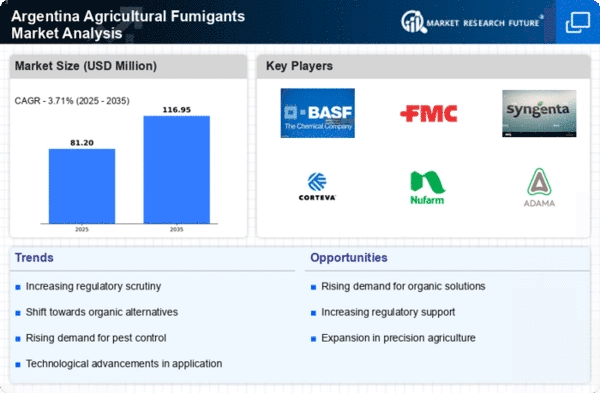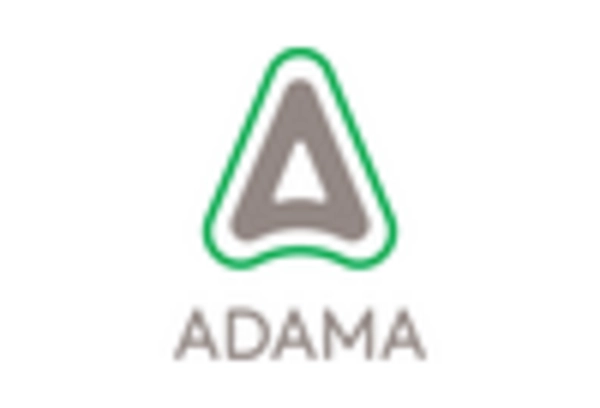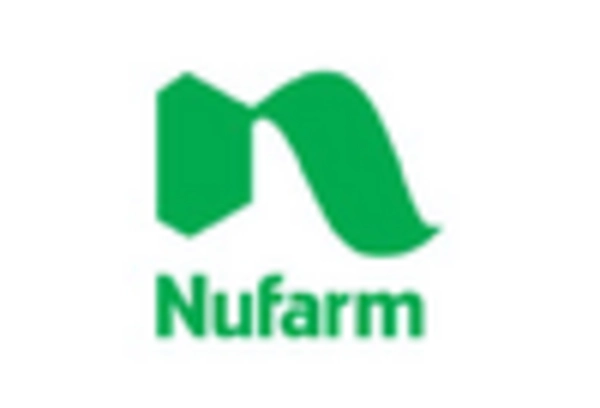Increasing Pest Resistance
The agricultural fumigants market in Argentina is experiencing growth due to the rising incidence of pest resistance. As pests evolve and develop resistance to conventional pesticides, farmers are increasingly turning to fumigants as an effective solution. This shift is particularly evident in key crops such as soybeans and corn, which are staples in Argentina's agricultural sector. The market for agricultural fumigants is projected to expand as these products offer targeted action against resistant pest populations. In 2025, the market is expected to reach approximately $150 million, driven by the need for effective pest management strategies. The increasing awareness among farmers regarding the efficacy of fumigants in controlling resistant pests is likely to further bolster market growth.
Regulatory Support for Fumigants
Regulatory frameworks in Argentina are evolving to support the use of agricultural fumigants, which is positively impacting the market. The government has recognized the importance of these products in ensuring food security and enhancing agricultural productivity. Recent policies have streamlined the approval process for new fumigant formulations, making them more accessible to farmers. This regulatory support is crucial, especially in a country where agriculture plays a vital role in the economy. The agricultural fumigants market is anticipated to benefit from these favorable regulations, with an expected growth rate of around 5% annually. As farmers gain easier access to effective fumigants, the overall market is likely to expand, addressing both pest control and crop yield enhancement.
Climate Change Impact on Agriculture
The effects of climate change are increasingly felt in Argentina's agricultural landscape, influencing the agricultural fumigants market. Changes in temperature and precipitation patterns are leading to shifts in pest populations and the emergence of new pest species. As a result, farmers are compelled to adapt their pest management strategies, often turning to fumigants for effective control. The agricultural fumigants market is expected to see a growth rate of around 5% as farmers respond to these climatic challenges. The need for effective pest management solutions in the face of climate variability is likely to drive the demand for fumigants, ensuring their continued relevance in the agricultural sector.
Technological Innovations in Fumigation
Technological advancements in fumigation methods are significantly influencing the agricultural fumigants market in Argentina. Innovations such as precision application techniques and improved formulation technologies are enhancing the effectiveness and safety of fumigants. These advancements allow for more targeted applications, reducing the environmental impact while maximizing pest control efficiency. As farmers become more aware of these technologies, the adoption rate of modern fumigants is expected to rise. The market is projected to grow by approximately 4% annually as these innovations become more mainstream. The integration of technology in fumigation practices is likely to reshape the agricultural fumigants market, making it more efficient and sustainable.
Rising Export Demand for Agricultural Products
Argentina's agricultural sector is heavily reliant on exports, particularly in commodities like soybeans and wheat. The increasing The agricultural fumigants market as farmers seek to maximize yields and ensure quality. To meet international standards, Argentine farmers are adopting advanced fumigation techniques to protect their crops from pests and diseases. This trend is expected to propel the market, with estimates suggesting a growth of 6% in the agricultural fumigants market by 2026. The need to maintain competitive pricing and quality in the export market is likely to encourage the adoption of fumigants, thereby enhancing the overall market landscape.
















